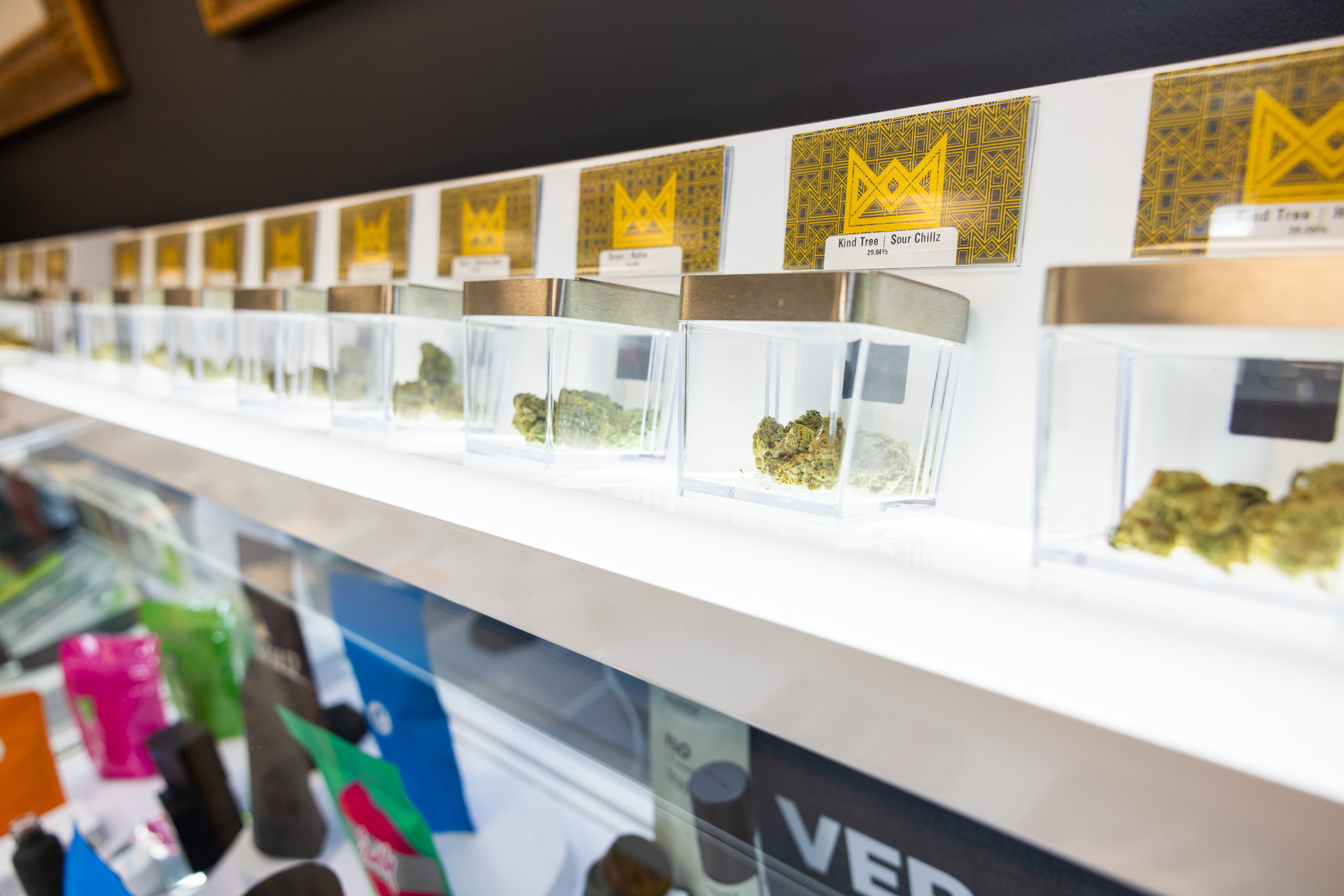Unravel the mysteries of cannabinoids and terpenes to see how these elements shape your cannabis experience. We’re here to educate you on these intriguing insights and dive into what makes cannabis unique to you!
Defining the difference: cannabinoids vs. terpenes
Cannabinoids are chemical compounds that interact with the endocannabinoid system (ECS) in our bodies, while terpenes are aromatic compounds that influence the smell and taste of more than 20,000 plants, including cannabis. When combined in cannabis products, these two compounds are theorized to have a synergistic effect. Called the “entourage effect,” it’s believed that cannabinoids and terpenes have some sort of synergy and influence how your body responds to each compound.
Learn more about cannabinoids
Did you know that cannabinoids are crucial to our well-being? These compounds come from two places — phytocannabinoids (from plants) like THC and CBD found in cannabis, and endocannabinoids made, used, and recycled by our bodies. These cannabinoids interact with a series of receptors in your body’s endocannabinoid system (ECS), which can be found in your central nervous system, skin, immune system, organs, brain, and more. They’re thought to play a role in a seemingly endless list of processes, including regulating pain perception, sleep, mood, and appetite and digestion — and that’s just to name a few!
More than 100 phytocannabinoids have been identified by researchers so far, with more scientific knowledge emerging every day about how these cannabinoids influence our bodies and minds.
Learn more about terpenes
Let’s take off on an aromatic journey through the world of terpenes, organic compounds found in various plants throughout the world. Terpenes are nature’s gift of flavor and fragrances, but they may play a much bigger role than just smelling and tasting nice. Terpenes have been observed in studies to have antibacterial, analgesic, anti-inflammatory, and antimicrobial properties, among many other traits.
Unlike cannabinoids, terpenes do not interact with your endocannabinoid system — for the most part. A notable exception to this rule is beta-caryophyllene, which has been observed to influence certain receptors in the ECS. Terpenes are also quite sensitive to temperature, and on average, they have a lower boiling point than cannabinoids.
Comparing cannabinoids and terpenes
Get a side-by-side look into the major differences between cannabinoids and terpenes with this handy chart.
| Cannabinoids | Terpenes | |
| What are they? | Chemical compounds found in the cannabis plant | Aromatic compounds found in various plants |
| Effects | Interact with cannabinoid receptors | Influence aroma and flavor |
| Examples | THC, CBD, CBN, CBC | Limonene, caryophyllene, pinene |
| Boiling points | As low as around 311°F | As low as 225°F |
| Interacts with the ECS? | Yes | Mostly no |
| How many IDd by scientists | 100+ | 20,000+, with around 100-400 found in cannabis so far |
Cannabinoids you should know
The first step to a great cannabis experience is understanding which cannabinoids your product contains and the effects they can have on your body and mind. Some of the major and minor cannabinoids cannabinoids you should know about include:
- THC: Known for its cerebral effects and the famous “high” associated with consuming cannabis, delta-9-tetrahydrocannabinol is abundant in the cannabis plant. It’s also the most researched cannabinoid; THC has been studied for decades for its potential effect on the digestive system, pain perception, mood, sleep, and many more processes.
- CBD: Unlike THC, CBD does not give you that “high” effect, but that’s precisely why it’s attracted so much attention. Another commonly-studied cannabinoid, Cannabidiol influences your ECS by acting as an antagonist to THC. Practically speaking, this means you won’t feel the effects of THC as strongly when consuming CBD along with it. On its own, CBD has been observed to affect seizures, anxiety, and a host of other conditions.
- CBN: Believed to enhance relaxation, Cannabinol is a byproduct of THC as it ages and is exposed to oxygen. It’s believed that the “couch lock” effect that you may get with cannabis is caused by CBN. It’s no surprise, then, that CBN is widely sought after by folks looking to get a good night’s rest.
- THCV: THCV may be a close relative to THC, but Tetrahydrocannabivarin has notably different effects. It shares anxiolytic (anti-anxiety) properties with THC, but they diverge when it comes to appetite. When THC notoriously encourages the “munchies,” THCV may actually suppress appetite
- CBC: While not as well known as other minor cannabinoids, CBC shows promise in cannabis research. It’s believed to have anti-inflammatory and therefore pain-relieving effects.
What about acidic cannabinoids?
Before cannabis is heated, all cannabinoids exist in their acidic form. Cannabinoids must be exposed to heat, whether by lighting it aflame, turning on a vaporizer, or decarboxylating cannabis in an oven, to evolve into their active forms. Without heat, acidic forms don’t have the same impact on your body and mind.
On the cannabis flower or pre-roll label, the product’s acidic content is expressed by adding an “A” to the end of the cannabinoid abbreviation. For example, CBDA is the acidic form of CBD, while THCA is the acidic form of THC. So if you see that a pre-roll you want to buy contains approximately 20% THCA, you can expect around 20% active THC when you go home to try it out.
8 terpenes you should know about
While scientists have identified around 200 terpenes that appear in cannabis, you won’t find that many in each cannabis cultivar (also known as a strain). Depending on the flower, vape, or concentrate you’re buying, you can expect a different terpene profile. Some of the terpenes you’ll find in cannabis products are:
- alpha-Pinene: Known for its pleasant forest-y scent, this terpene holds potential anti-inflammatory properties. It has an earthy and herbal taste. You can find this terpene in strains like Pineapple Express and Blue Dream.
- beta-Caryophyllene: Peppery and spicy notes are the hallmarks of this terpene. Beta-caryophyllene is associated with stress relief and anti-inflammatory properties that may be good for those with chronic pain. You can find beta-caryophyllene in strains like Sour Diesel.
- beta-Myrcene: This terpene boasts an herbal and fruity fragrance. Among the most common terpenes in cannabis, it’s believed to promote relaxation and sedation. It’s also present in many Indica strains, which may explain why indicas have historically been associated with relaxation. Mycrene carries a sweet and spicy flavor. It is prevalent in strains such as Granddaddy Purple and OG Kush.
- Limonene: As citrusy as a glass of freshly squeezed lemonade, it’s no wonder this terpene is believed to be a mood-booster. Limonene can be found in strains such as Wedding Cake, offering a sweet and sour taste.
- Ocimene: This terpene offers a sweet, floral, woody smell and a fruity taste. This uplifting terpene is present in strains like Clementine and Jack Herer.
- Terpinolene: Golden Goat and Super Lemon Haze strains boast significant levels of terpinolene, which has floral, herbal, and citrus notes.
- Humulene: Earth scents take center stage with humulene, a terpene believed to have a creativity-boosting, mind-relaxing effect. The strain GSC contains significant amounts of humulene.
- Linalool: Known for its floral and sweet-like scent, linalool uplifts and transports you to a lavender field. Amnesia Haze and Lavender Kush strains contain linalool terpene.
Discover cannabinoids and terpenes at Queen City
When shopping for THC in central New Jersey, you’re not just getting high-quality cannabis products, but you’re supporting the greater Plainfield community. At Queen City, we’re here to guide you on your cannabis journey with zero judgment and open arms. Our helpful budtenders can guide you through our extensive menu and help you find the cannabinoid and terpene profile that works best for your goals. And if you have any more questions on cannabinoids and terpenes, we’re here to answer them!


